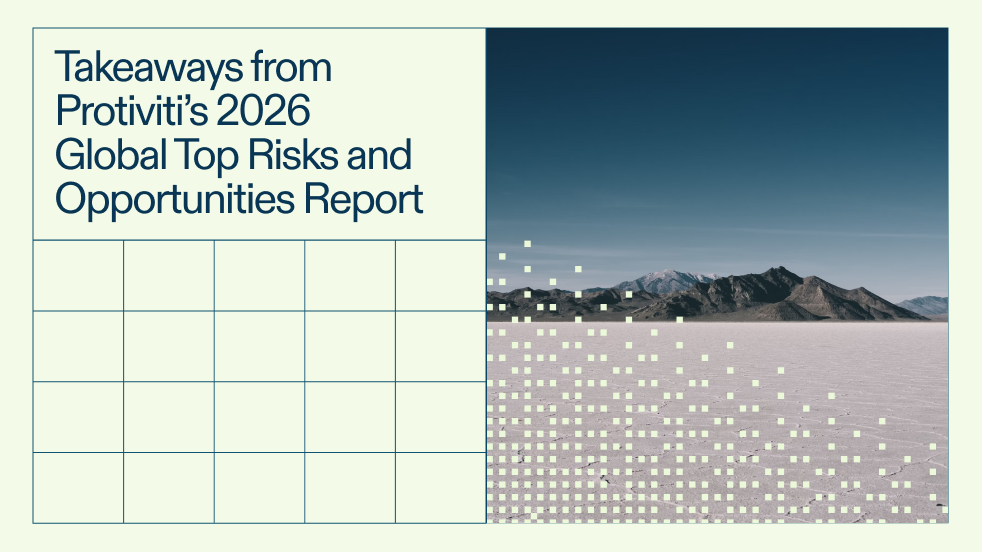
June 15, 2022 • 7 min read
Liz Sandwith of the Chartered IIA on Speaking Up, Being Brave, and Gaining Respect
Join Richard Chambers for a new episode of his Agents of Change video series, featuring conversations with internal audit leaders from some of the world’s most prominent organizations about innovation in the profession.
In this episode, Richard sits down with Liz Sandwith, Chief Professional Practice Advisor at the Chartered Institute of Internal Auditors and Managing Partner at Sandwith Internal Audit Services, to discuss her calls to action for internal audit to earn the respect of the business, including:
- Speak Up: we fought for a seat at the top table, but CAEs must use their voice to contribute to the organization’s success.
- Step Up: in a crisis, internal audit must take action to help the business — there’s no point in being independent in an org that no longer exists.
- Be Honest: new risks highlight gaps that internal audit will need to upskill for — be forthright about your abilities and your plans to address needs.
- Be Brave: have the tough conversations about risks we see coming and potential impacts on organizational sustainability.
Watch the full conversation, and read the can’t-miss highlights below.
Earn the Respect of the Business to Become a Trusted Advisor
Richard Chambers: Liz, you and I have compared notes on a number of occasions about the journey that we’ve had professionally, and the journey of the internal audit profession. I think we both observed that over the course of our careers, we’ve seen the nature of internal audit change a lot from the days we entered. One of the things that I think makes it different today is that there is increasingly an expectation by internal audit stakeholders that auditors not only help protect value, but they also get out there and help create value. Are you seeing that from where you sit?
“Liz Sandwith: Yes, I think that’s a really good perspective. I couldn’t help but smile when you said how it had changed. I remember the first audit I did, being given a pile of 250 invoices and an orange pen, and told to check them. I think any internal audit function today would turn their nose up at that. So, yes, it’s changed a lot, and it’s more around the seat at the top table for the CAE — demonstrating the real value we bring to the profession, and being respected.”
Step Up to Help the Business in a Crisis — There’s No Point in Being Independent in an Org That No Longer Exists
Richard Chambers: I think you’re right. We often talk about how a seat at the table requires us to earn and sustain the trust that goes with that. As I think about the change that the profession has been through, I’m also thinking about the fact that internal auditors are increasingly being called upon to be change agents in the roles they play. In my book that I published in 2021, I wrote about internal audit agents of change as those who are catalysts for transformational ideas that create value for the organizations they serve. Does that sound like a role that internal audit should play?
“Liz Sandwith: Absolutely, and I think as well, it’s a role that internal audit is playing more at the moment. If you think back over the last two years, and probably even slightly before the pandemic hit, internal audit was perhaps seen as being over there in the corner, doing some great work, but not really showing how they fit into the organization.”
Richard Chambers: You touched on something there that has long been a source of some controversy: how much internal audit should ever step into the business, how much they should play a role. Now, I’ve been one who said there are extraordinary circumstances in which internal audit needs to pitch in and do what it can to help the organization get through a crisis. I certainly felt that way about the pandemic. For those who might say, “Oh, we can’t ever do any first line work because then our independence is compromised, our objectivity is compromised,” what’s your reaction to that?
“Liz Sandwith: I think I quoted you when we first started doing our Heads of Internal Audit Virtual Forum in April 2020. One of the first conversations we had was around internal audit independence. There were a lot of heads of audit with their arms folded, saying “No, no, no, we can’t possibly get involved in that. We’re internal audit. We have to manage our independence.” Actually, no, because there’s no point being independent in an organization that no longer exists. I quoted you when you talked in one of your blogs about independence. “Don’t hide behind a wall of independence, roll your sleeves up and help the future sustainability of your organization.” That’s so important.”
Richard Chambers: I think we both agree that it’s not a permanent or long-term role, but there are times where you just have to be there to lend a helping hand if you have that expertise.
We Fought for a Seat at the Top Table — Speak Up and Contribute to the Organization’s Success
Richard Chambers: We talk about internal auditors as change agents. Do you think boards and CEOs and the C-suite are seeing internal audit in that role? You see a lot of leading companies. What is your sense of how they see internal audit right now?
“Liz Sandwith: I think there is a shift toward seeing internal audit more in that space. I think it’s a bit slower shift from your C-suite, your board, your audit committee, than perhaps one might wish, because there is sometimes some confusion and lack of real appreciation about what internal audit can really bring to the table. I think some of that is influenced by the fact that some CAEs now have their seat at the top table and say nothing. They’re there in the room, but don’t speak — that creates confusion for C-suite, for your CEO, and also sometimes for your audit committee and board.”
Richard Chambers: That’s right. That’s the value that internal audit harbors sort of in the back room sometimes — the knowledge about risk and controls in the organization that’s often accumulated over decades of work. There’s no value to the organization if that just stays in our workpaper files.
“Liz Sandwith: Yes, you’re absolutely right. We need to articulate it. We need to be out there talking to people, having regular conversations. One of the things that we pushed very much in the UK and Ireland in the early part of the pandemic was, why are you not talking to your audit committee, your chair, maybe daily, weekly? The world is changing so fast. Don’t say, “Yeah, but we only have a quarterly meeting.” No, pick up the phone, talk to them. Find out what they’re looking for from you and how you can support them in terms of the assurance that you are providing, what’s keeping them awake at night, but also, how can we be more innovative in what we’re doing?”
Be Honest About New Risks Highlighting Gaps IA Will Need to Upskill for
Richard Chambers: You make a great point, Liz, when you’re talking about the importance of modernizing the approaches that we take. I make the point in the book that in order to be seen as credible change agents within our organizations, we have to be seen as willing to change ourselves. That includes becoming more efficient, more effective, using more technology. Do you see it the same way?
“Liz Sandwith: I do absolutely, and I’ve quoted you speaking at our conference in 2019, when you talked about internal audit methodology not changing for 15, 20 years. Actually, now is the time. The pandemic gave us that real opportunity to change. But it’s not just about, “Oh, we’ll change our methodology,” or, “We’ll do a shorter report,” but actually being honest about what’s going on. A CAE saying, “Do you know what, audit committee? I can’t give you an assurance around climate because I’m learning about that myself at the moment.” Instead of it being assumed that everything is about process and about procedures, actually recognizing that some of the new risks coming down the track are going to highlight gaps in internal audit knowledge that we are going to have to upskill for. Be honest with your audit committee. “Do you know what? I’m not comfortable doing that because we don’t have the skillset, but I have a solution. I have a way to get that skillset to give you that assurance.””
Richard Chambers: That’s right. Sometimes being a change agent is bringing in someone else to help you drive a change.
Why Business Acuity Is a Fundamental CAE Skill
Richard Chambers: Before we wrote the book, we asked 600 chief audit executives from around the world, what does it take to be a successful change agent in internal audit? There were four key themes that emerged: strong business acumen, strong at relationships, strategic mindset, and innovation. Do you think that captures it? Are there other things that you would add to that list?
“Liz Sandwith: I think that captures it. One of the things I hear a lot from audit committees is that internal audit really doesn’t understand the business. So commercial acuity is something that’s desperately needed. Instead of internal audit being a bit blinkered and just thinking, this is my organization, ask: what sector do I sit in? What geographical location am I in? Do I have a footprint elsewhere? What does that mean? Do I understand territorial legislation, territorial regulations? How does that impact here? Where are we going to balance ourselves to be able to provide the assurance to the audit committee?”
Richard Chambers: I might say that I think a lot of them understand where the business has been, but they need to understand where the business is going.
Be Brave Enough to Have the Tough Conversations About Risks We See Coming
I do have one last question for you, though. What do you think could happen to this profession in the next decade? What would you say?
“Liz Sandwith: It’s going to be a very bumpy ride. I think even before the war in Ukraine, we had inflation, supply chain issues, fuel shortage, the Great Resignation, all of those sorts of challenges that everybody said were not going to go away. We’re not talking six months here. We’re talking two, three years. I think internal audit needs to be horizon-scanning. We need to be looking ahead. We need to be brave in terms of what the conversations are we’re having with our board. “We think this is coming down the track. And we think this is what you need to be mindful of. If you don’t, there are risks associated to your future sustainability.” And sometimes we need to call out the car crash we see coming, and be brave.”
Richard Chambers: Liz, thank you so much for joining me today, and for being brave enough to share your thoughts with our audience. I think this profession has been on an amazing journey. I think there’s a lot of great potential out there. And I hope that you’re going to be one of those who will continue to be a champion for our profession as we go forward.
Check out more audit leader interviews with Richard Chambers on our Agents of Change video series channel.
You may also like to read


Audit reporting best practices: Guide for audit leaders

Latest data on AI adoption reinforces need for internal auditors’ “superpowers”

AuditBoard and IAF report: The more you know about AI-enabled fraud, the better equipped you are to fight it

Audit reporting best practices: Guide for audit leaders

Latest data on AI adoption reinforces need for internal auditors’ “superpowers”
Discover why industry leaders choose AuditBoard
SCHEDULE A DEMO



